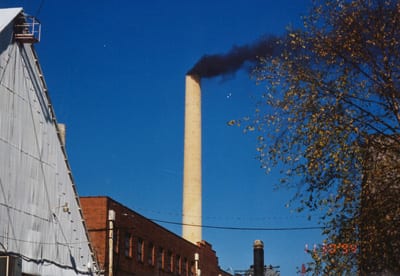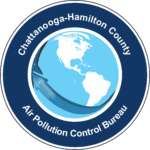Industry Permits
The most significant way that the Air Pollution Control Bureau controls air pollution in Hamilton County is by permitting facilities that are potential sources of air pollutants. All industry operating in Hamilton County that have the capability to emit any air pollutant is required to obtain an air pollution permit. This permit may be in the form of a Certificate of Operation for minor pollution sources or a Part 70 Operating Permit for major sources. The Bureau engineering staff addresses all permitting issues for the companies to which they are assigned, and conduct annual inspections, track air emissions, and develop special operating conditions to ensure compliance with the applicable rules and regulations.
Part 70 Operating Permits (Major Sources)
As mandated by Title V of the Clean Air Act Amendments of 1990, the Bureau implemented an operating permit program that applies to major sources of air pollution. In 1996, the EPA approved the program. In addition, Congress required that a fee structure be put into place to have the major sources pay for the administrative costs of the permit program, thus shifting the burden from tax payers and placing it on the sources of air pollution.
Local companies are considered major sources* of air pollution if they meet the following the following criteria:
the potential to emit 100 tons or more per year of any criteria pollutant the potential to emit 10 tons or more per year of any one of the 188 listed hazardous air pollutants or 25 tons or more of any combination of the listed hazardous air pollutants acid precipitation sources any other source the EPA Administrator determines by rulemaking should be included.
* Certain companies are required by EPA to keep their major source status even if they no longer pollute at major-source levels.
Synthetic Minor Sources
These pollution sources have the potential to emit what would be considered major sources of air pollution, subjecting them to Part 70 requirements, but have agreed to enforceable permit limitations to reduce their potential to emit. As long as these sources do not violate the conditions which are placed in their current certificates of operation, they are not subject to Part 70 requirements and fees.
Minor Sources
Companies that have the potential to emit pollution but do not meet the major source criteria are under this classification. Minor source companies must obtain a certificate of operation for each piece of equipment or process that may release pollutants into the air. Special operating conditions are developed for each certificate to ensure compliance with all application rules and regulations. The minor sources are subject to the same regulations as Part 70 major sources and synthetic minor sources.
Installation Permits
Industries that are potential sources of air pollution must receive an installation permit before constructing, installing, or reconstructing any equipment that has the potential to emit air pollutants. Installation permits contain emissions limitations and operating requirements that must be agreed to by the source prior to receiving the permit. A certificate of operation must be issued or a Part 70 permit application must be received prior to operating the equipment.
For additional information, contact the Bureau Engineering Manager at (423) 643-5970.
Permit Forms
Major Source (Title V)
- 70-01 Facility Identification
- 70-02 Operations and Flow Diagrams
- 70-03 Stack Identification
- 70-04 Fuel Burning Equipment
- 70-06 Storage Tanks
- 70-07 Incineration
- 70-08 Printing Operations
- 70-09 Painting & Coating Operations
- 70-10 Miscellaneous Processes
- 70-11 Control Equipment – Miscellaneous – General Control Equipment (GCE)
- 70-12 Condensers
- 70-13 Adsorbers
- 70-14 Control Equipment – Catalytic or Thermal Oxidation
- 70-17 Control Equipment – Wet Collection System
- 70-18 Control Equipment – Baghouse/Fabric Filters
- 70-19 Compliance Certifiation – Monitoring and Reporting
- 70-20 Compliance Demonstration by Continuous Emissions Monitoring
- 70-21 Compliance Demonstration by Portable Monitors
- 70-22 Compliance Demonstration by Monitoring Control System Parameters
- 70-23 Compliance Demonstration by Monitoring Maintenance Procedures
- 70-24 Compliance Demonstration by Stack Testing
- 70-25 Compliance Demonstration by Fuel Sampling and Analysis
- 70-26 Compliance Demonstration by Recordkeeping
- 70-27 Compliance Demonstration by Other Methods
- 70-28 Emissions from Process Emission Source/Fuel Burning Equipment/Incinerator
Minor/Synthetic Minor Source (non Title V)
- E001 Basic Application
- F001 Synthetic Minor Application
- E010 Process Equipment Application
- E010A Surface Coating Operation Application
- E011 Fuel Burning Equipment Application
- E012 Incinerator Application
- E013 Odor/Miscellaneous Equipment Application
- E014 Minor Pollution Source Application
- E102 Baghouse Equipment Data
- E103 Wet Scrubbing Device Data
- E104 Electrostatic Precipitator Equipment Data
- E105 Inertial Separator Equipment Data
- E106 Pollution Estimation Form (Process Equipment)
- E107 General Control Equipment Application Form
- E108 Adsorption Systems Application
- E109 Afterburner (Thermal/Catalytic) Equipment Data
- E110 Pollution Estimation Form (Fuel Burning Equipment)
- E111 Masking Agent or Odor Counteragent Application
- E112 Flare Combustion Application
- E113 Absorption Device Applcation (Gas Absorption, Towers, Venturi Scrubber, etc)

